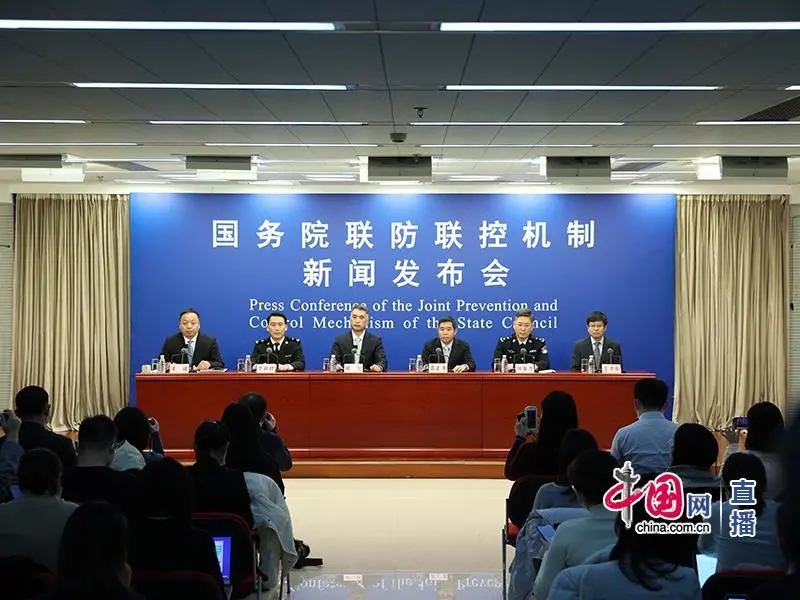Press Conference of the Joint Prevention and Control Mechanism of the State Council: Continue to Implement Strict Entry and Exit Policies
Share on wechat
×
Use wechat to "scan" to share the web page with your wechat friends.

Guest: Liu Haitao, Director General of the Department of Frontier Inspection and Management of NIA
Venue: Beijing
Date: 20 December, 2021
Transcript:
[Macau News Agency]:
The end of the year is always the peak season for international logistics. Considering the rapid spread of the Omicron virus, I would like to ask if the National Immigration Administration (NIA) has taken any further measures to prevent imported cases by sea.
[Liu Haitao]:
Thank you for your question. With a global network of shipping routes and services, and an average of more than 400 inbound international vessels per day, we face a high risk of imported COVID-19 cases by sea. NIA has adopted the measures of "promoting one code, establishing one channel, and strictly implementing three restrictions", so as to further improve the pandemic prevention and control among crew members of international vessels, ensure the smooth flow of the global maritime logistics supply chain, and prevent imported COVID-19 cases by sea. Specifically:
First, we have been implementing the China Immigration Boarding Code (Boarding Code) in full swing. NIA started to implement the Boarding Code at 129 sea ports across the country on 10 December this year based on the pilot project. The code enables early warning of high-risk ships in terms of COVID-19 infection, contactless declaration by port staff on embarking and disembarking, automatic verification of health codes, nucleic acid test results and vaccination information of embarking and disembarking personnel, and one-click enquiry of information on embarking and disembarking. Up to now, more than 85,000 users have registered for the Boarding Code, covering more than 3,800 port berths. And the immigration inspection authorities have sent more than 4,100 pieces of data on high-risk international ships to the local joint prevention and control mechanisms for early warning, and cooperate in the contact tracing of more than 2,000 people. These efforts have provided robust support for strengthening the early warning of risks of international ships, the whole process supervision of embarking and disembarking staff, the closed-loop management of port staff, and the contact tracing of infected personnel.
Second, we have established special entry channels for seafarers. Special entry channels have been set up for seafarers of international vessels at the inspection sites of immigration inspection authorities to further strengthen the separation of entry and exit areas, the diversion of seafarers and port staff, and the classification of personnel at different risk levels, so as to strictly prevent the mixing of personnel and cross-infection.
Third, we strictly implemented the policy of "no boarding, no entry and no berthing" for unessential reasons. The entry inspection of international vessels and personnel was strengthened, and strict supervision was carried out during their stay at ports. In response to the recent discovery of attempting to forge negative nucleic acid test certificates to apply for boarding permits, we have further intensified scrutiny and supervision and strictly approved boarding and docking documents and temporary entry permits to prevent boarding, entry and berthing under non-essential circumstances. For those crew members and port staff on duty to embark and disembark, they would be supervised to protect themselves on board and during production operations to ensure safety against the pandemic, guarantee normal operations and help smooth the international maritime logistics supply chain. Thank you.
[Phoenix TV]:
As the New Year's Day and the Chinese New Year are approaching, there may be an increase in demand for people to travel across the border. I would like to ask if NIA has any plans to make adjustments to the entry-exit policies for Chinese citizens in response to the peak season. Thank you.
[Liu Haitao]:
Thank you for your question. Since the outbreak of COVID-19, we have always insisted on the policy of not leaving the country for non-essential or non-emergency reasons, and have reduced the cross-border movement of people for non-essential reasons such as tourism. This measure has proven to have a positive effect on preventing the spread of the pandemic across borders and safeguarding the lives and health of both Chinese and foreign residents.
Currently, the COVID-19 rebounds overseas with the Omicron variant spreading in many countries, and new confirmed cases worldwide have increased by more than 30% in the past month compared to the previous year. Many countries have again tightened entry restrictions, closed border crossings and extended quarantine periods for people entering the country. NIA will unswervingly and fully implement the general strategy of "guarding against imported cases from abroad and preventing a resurgence of the outbreak at home", and will continue to adhere to strict entry-exit policies to avoid exits under non-emergency or non-essential circumstances, so as to ensure a safe New Year's Day and Spring Festival for our people.
We would also like to take this opportunity to remind the public to pay close attention to the information on the pandemic situation abroad and the immigration restrictions of your travelling destination countries. It is suggested to fully assess the possible risks of cross-infection, detention abroad, long quarantine periods and so on, take care of your own health and safety, and suspend exiting the country for non-emergency or non-essential purposes. NIA will actively facilitate the processing of entry-exit documents and inspection for Chinese citizens who are going abroad for academic, employment or business purposes, especially those who need to exit for global pandemic prevention and control efforts and business resumption. NIA will release relevant national immigration control policies on its official website, and WeChat and Weibo platforms in time, so please pay close attention to them. You can also call the 24-hour service hotline at 12367 to learn more about the situation in advance, prepare accordingly and make proper arrangements for your travelling.
Notice: The English version is only for reference. To learn more, please refer to the authoritative Chinese version.


